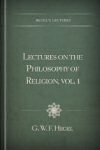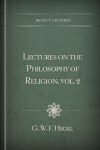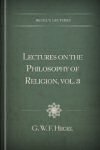Hegel's Lectures on the Philosophy of Religion (3 vols.)
Digital Logos Edition
Overview
Georg Wilhelm Friedrich Hegel is one of the most influential thinkers in modern philosophy. The Hegelian dialectic—the idea that truth is attained by synthesizing an idea (thesis) and its opposite (antithesis)—continues to dominate much of Western philosophy. In the dynamic process of the Hegelian dialectic, the two opposites are neither annihilated nor subsumed into each other. Rather, they’re integrated and united to form one new concept. This concept then becomes a thesis, which then develops an antithesis, and the dialectic continues. In Lectures on the Philosophy of Religion, Hegel applies this dialectic to the study of religion.

- All of the lectures on the philosophy of religion, revised with an introduction by the editor
- In-depth index
- Lectures on the proofs of the existence of God
- Title: Hegel’s Lectures on the Philosophy of Religion
- Author: G.W.F. Hegel
- Translators: E.B. Speirs and J. Burdon Sanderson
- Publisher: Kegal Paul, Trench, Trübner, & Co.
- Volumes: 3
- Pages: 1,077
This title is included in the following collections
You can save when you purchase this product as part of a collection.
Modern Philosophy Research Lib...
$499.99$499.99Philosophy Research Library (1...
$799.99$799.99Logos 6 Orthodox Gold Legacy L...
$849.99$849.99Logos 6 Orthodox Platinum Lega...
$1,499.99$1,499.99
- $2,999.99
- $2,999.99
- $21,749.99
- $24,999.99

Volume one contains the lectures “Introduction to the Philosophy of Religion,” “The Conception of Religion,” and “Definite Religion.”

Volume two contains “Definite Religion” (cont.) and “The Absolute Religion.”

Volume three contains “The Absolute Religion” (cont.) and seven lectures on the proofs of the existence of God.
Georg Wilhelm Friedrich Hegel (1770–1831) was born in Stuttgart, Germany. He received his early education at the Gymnasium Illustre in Stuttgart. He entered the seminary at the University of Tubingen in 1788, graduating with a degree in theology. After graduating, Hegel tutored the children of an aristocratic family in Berlin. He left Berlin to lecture on logic and metaphysics at the university in Jena, becoming an extraordinary professor in 1805. Displaced by Napoleon’s campaign through Prussia, Hegel took the position of editor at a newspaper in Bamberg. In 1808, Hegel left Bamberg to become headmaster of a gymnasium in Nuremberg. In 1811, he married Marie Helena Susanna von Tucher, with whom he had two sons. Hegel briefly accepted a post at the University of Heidelberg before accepting the chair of philosophy at the University of Berlin, where he remained until his death.
Reviews
6 ratings
AeliusCicero
6/19/2014

David Leslie Bond
11/20/2013

RICHARD A. RAY
10/23/2013

Michael Mullen
9/17/2013
Michael Maria Waldstein
8/25/2013
John Kuvakas
8/1/2013